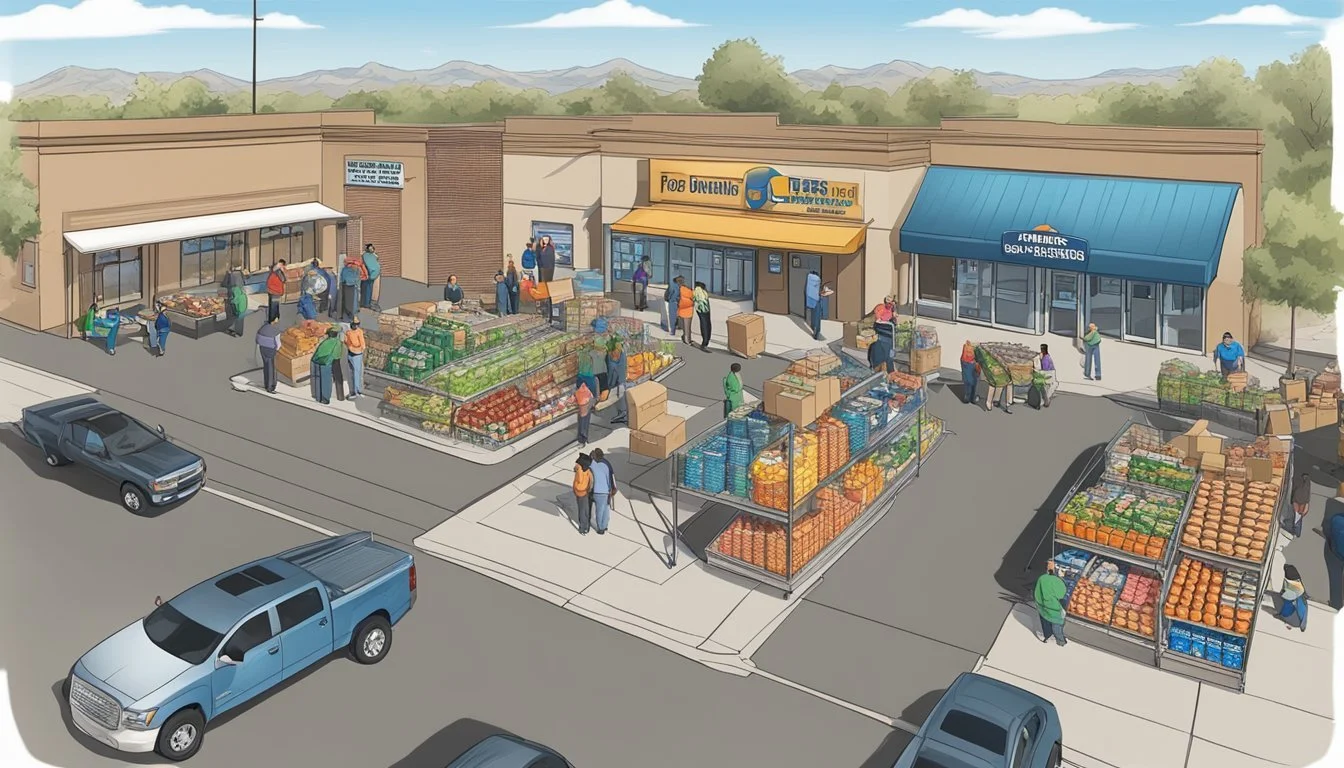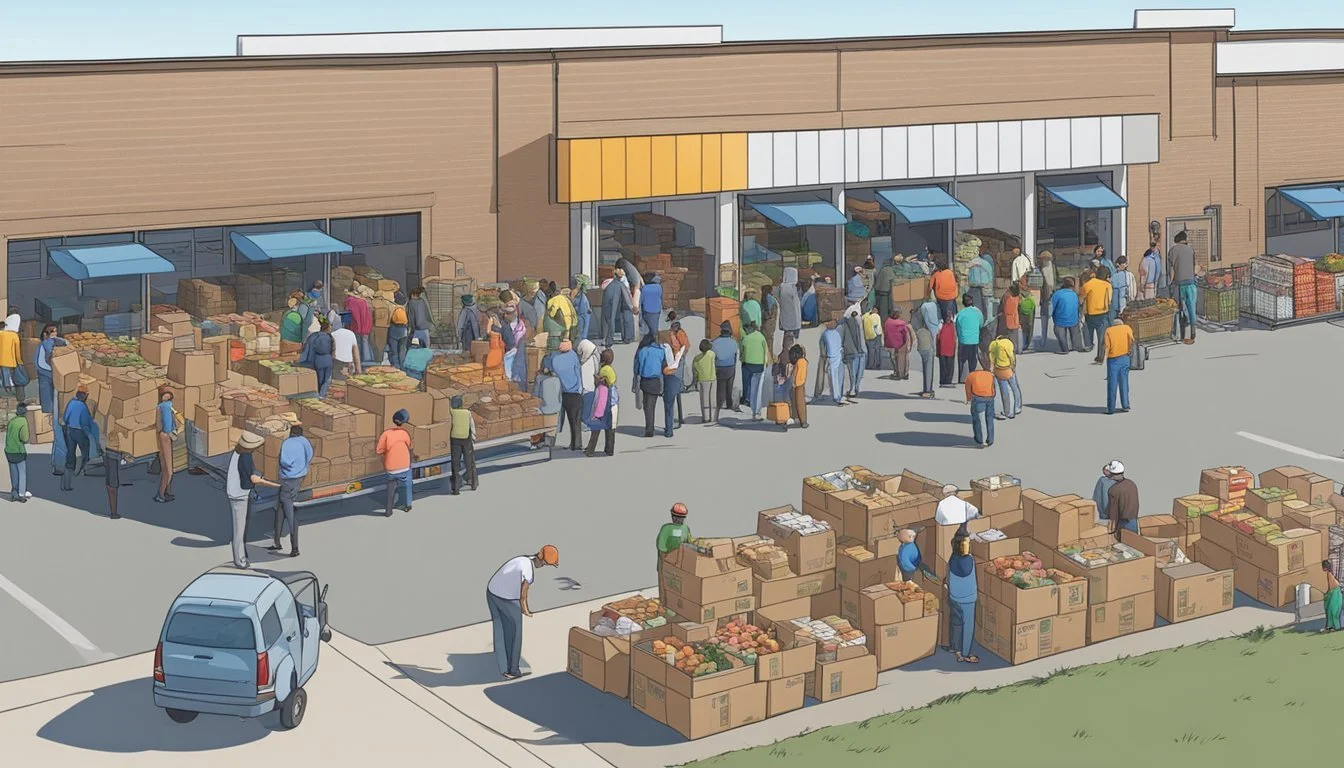Free Groceries and Food Pantries in El Paso County, Texas
Your Guide to Local Resources
This Article is Part of Our Guide on Free Groceries in Texas
El Paso County, Texas, is a community that recognizes the importance of food security and the need to provide resources for those facing difficulties in accessing adequate nutrition. Free groceries and food assistance programs form a vital network of support for many individuals and families in the area. These services are indispensable for the well-being of the community, ensuring that no one has to go without basic sustenance due to financial constraints. Through a variety of food pantries and distributions, El Paso County is committed to fighting hunger and offering relief to those in need.
The assistance landscape in El Paso includes food pantries like the Montwood Church of Christ Food Pantry, which specifically serves residents of certain zip codes with monthly distributions. Other entities, such as the El Pasoans Fighting Hunger Food Bank, expand this support by providing a broader range of services. These programs are often supplemented by charitable donations and volunteers, reflecting the community's spirit of helping one another. In addition to traditional pantries, some local businesses and organizations have stepped up to offer unique forms of aid, such as free grocery delivery for seniors, recognizing the challenges that come with age and limited mobility.
The framework of food security in El Paso County is multifaceted, addressing the immediate needs while also fostering a sense of community resilience. These food assistance programs not only provide free groceries but also connect people to a network of support, ranging from soup kitchens to shelters. For those interested in learning more or seeking help, numerous resources are available, and inquiries about food assistance can typically be made through phone calls to the respective agencies.
Understanding Food Insecurity in El Paso County
Food insecurity is an ongoing crisis faced by many households in El Paso County. It refers to the lack of consistent access to enough food for an active, healthy life. This challenge is not just about hunger; it's about the ability to obtain nutritious food that meets the needs of individuals and their families.
The economic repercussions of the COVID-19 pandemic have intensified this issue, leaving a higher number of individuals and families uncertain about where their next meal will come from. Despite the hard work of local food pantries and charitable organizations, the demand often surpasses the available resources.
El Paso County has recorded a food insecurity rate among children of approximately 24%. These children belong to low-income families who are at risk of not having sufficient food due to financial constraints. Here is a snapshot of the situation in El Paso County:
Population Affected: Individuals and families, particularly children
Key Issues: Limited access to nutritious food, economic hardship
Resources Stretched Thin: Food pantries and shelters facing increased demand, especially with migrating populations
Local initiatives, such as No Lost Food, aim to address both food waste and food insecurity by redistributing surplus food to those in need. Meanwhile, community programs and strategies are being recommended and implemented to improve healthy food access and security across the county. These strategies include increasing enrollment in the Supplemental Nutrition Assistance Program (SNAP) and creating incentives for healthy food options in underserved communities.
Listing of Food Pantries and Soup Kitchens
In El Paso County, residents in need can access a variety of food pantries and soup kitchens located across different regions. Each facility provides essential services to the community, ensuring that individuals and families can obtain free groceries and hot meals in a dignified and accessible manner.
Downtown Area
El Paso Downtown Food Pantry
Location: 123 Main St, El Paso, TX 79901
Zip Code: 79901
Hours: Monday - Friday, 9 am - 5 pm
Northeast Community
Northeast Helping Hands
Location: 456 North Ave, El Paso, TX 79904
Zip Code: 79904
Hours: Wednesday & Friday, 10 am - 3 pm
Southeast Region
Southeast Community Assistance Center
Location: 789 South St, El Paso, TX 79915
Zip Code: 79915
Hours: Tuesday & Thursday, 12 pm - 4 pm
Westside Locations
Westside Emergency Food Bank
Location: 101 West Rd, El Paso, TX 79922
Zip Code: 79922
Hours: Monday, Wednesday, Friday, 11 am - 2 pm
West El Paso Soup Kitchen
Location: 202 Westside Dr, El Paso, TX 79922
Zip Code: 79922
Hours: Daily, 6 pm - 7:30 pm
Eligibility and Access to Food Assistance
In El Paso County, Texas, individuals and families seeking food assistance through food pantries and similar services must meet certain eligibility criteria. These criteria generally revolve around income levels, residency status, and immediate food needs due to emergencies.
Income-Based Criteria
El Paso County provides food assistance primarily on an income basis, ensuring that support reaches those in financial need. Applicants typically need to provide proof of income to verify their eligibility. The local food pantries may adhere to the following income guidelines:
For households with more than 8 members, add an additional amount per additional member.
Household Size Maximum Monthly Income Level (Approx.) 1 $1,383 2 $1,868 3 $2,353 4 $2,839 5 $3,324 6 $3,809 7 $4,295 8 $4,780
Eligibility for federal programs like SNAP is also based on income and may provide additional support to those qualifying.
Residency Requirements
Residents of El Paso County can access local food assistance programs, typically by demonstrating proof of residency. They might be asked to present documentation such as a utility bill, rental agreement, or an identification card that shows an address within the county. Some programs may further restrict access based on specific zip code areas within El Paso, aiming to serve those in closest proximity to the pantry or service center.
Emergency Food Relief
For those in El Paso County facing urgent food crises, emergency food assistance is available without the standard income verifications. This relief effort caters to sudden adversities, such as natural disasters or unexpected financial hardships. Many local food pantries collaborate with relief organizations to provide this prompt support. Individuals may be referred to an emergency food service by a community agency or may directly contact one of the local food pantries when in immediate need.
How to Get Free Food: A Step-by-Step Guide
Accessing free food in El Paso County, Texas, can be streamlined by utilizing local food pantries, applying for SNAP benefits, and participating in the Commodity Supplemental Food Program. This guide outlines the specific steps to connect with these resources.
Food Pantry Visitation
Step 1: Locate a Food Pantry
Utilize resources such as the Feeding America website to find nearby food banks by inputting your ZIP code.
Once identified, note the phone number and address of the food pantry in El Paso, such as the Montwood Church of Christ Food Pantry.
Step 2: Contact and Schedule
Call the food pantry using the provided phone number to inquire about visitation rules and if an appointment is necessary.
Some pantries serve based on certain criteria like income or family size; it's imperative to confirm eligibility.
SNAP Application Process
Step 1: Determine Eligibility
Review the eligibility requirements for SNAP in Texas, which include income and household size assessments.
Step 2: Gather Documentation
Prepare necessary documents such as proof of income, identification, and residence.
Step 3: Submitting an Application
Apply for SNAP in Texas either online, by mail, or in person at a local Health and Human Services Commission office.
Step 4: Wait for a Decision
After submission, there will be a period of assessment where one might need to attend an interview (telephone or in-person).
Commodity Supplemental Food Program
Step 1: Understand the Program
The CSFP aims to improve the health of low-income elderly individuals by supplementing their diets with nutritious food.
Step 2: Verify Eligibility
Older adults (60 years and older) with income at or below 130% of the Federal Poverty Line qualify for the program.
Step 3: Application Submission
Contact the Texas Department of Agriculture or local CSFP provider to apply.
An interview and documentation are often required to complete the application process.
By following these steps, residents in El Paso County can efficiently tap into the available resources to access free food and groceries.
Additional Community Assistance Programs
In addition to food pantries, El Paso County offers a variety of assistance programs aimed at helping residents with basic needs such as housing, healthcare, and workforce development.
Rent and Utilities
Assistance with Rent: El Paso residents struggling to pay rent can seek help from local programs designed to prevent homelessness and housing instability.
Rental Assistance
Emergency Shelter Grants
Utility Support: Utilities support is also available to prevent the disconnection of services such as electricity and water during financial hardship.
Low Income Home Energy Assistance Program (LIHEAP)
Water Bill Assistance
Health and Social Services
Access to Healthcare: Community clinics in El Paso provide medical services on a sliding fee scale ensuring that low-income individuals and families receive necessary care.
Primary Healthcare Services
Preventive and Wellness Support
Social Service Programs: These programs address a range of needs from child care support to elder care and even mental health services.
Childcare Assistance Programs
Elderly Support Services
Educational and Employment Aid
Employment Services: Local agencies provide employment assistance, including job training, resume development, and access to job fairs.
Workforce Solutions Borderplex
Vocational Rehabilitation Services
Educational Support: Programs are in place to assist individuals in improving their educational qualifications and literacy levels.
Adult Education and Literacy Programs
GED Preparation and Testing Services
The Role of Local Organizations and Charities
Local organizations and charities in El Paso County are pivotal in providing food assistance to those in need. They establish robust networks for food distribution, rely on a significant volunteer workforce, and organize fundraising and donations to sustain their operations.
Food Distribution Networks
Charitable entities in El Paso County have set up extensive food distribution networks that ensure regular food assistance to local communities. Non-profit organizations like El Pasoans Fighting Hunger collaborate with over 132 partner agencies, which include food pantries, soup kitchens, and shelters, to enable efficient food distribution. This orchestrated effort ensures food reaches a variety of zip codes throughout the county, including 79901, 79902, 79903, 79905, 79912, 79915, and 79930.
Volunteer Initiatives
Volunteers are the backbone of these charities, providing the necessary labor to collect, sort, and distribute food donations. They drive the success of programs such as drive-thru pantries, which offer a mix of free food and groceries to community members from the safety and convenience of their vehicles. This volunteer-led initiative simplifies the process of food distribution, allowing for a broad reach within the county.
Fundraising and Donations
Fundraising and donations are crucial in maintaining the food supply to the needy. Charities often work with local businesses, farmers, manufacturers, and government agencies to secure food that would otherwise go to waste. They leverage community support to fund their numerous programs and food distributions, ensuring a continuous flow of resources and assistance to individuals and families in El Paso County.
Support for Specific Groups
Food insecurity affects various demographics within El Paso County, and there are programs specifically designed to address the needs of the seniors, youth, and disabled community members. These programs are crafted to provide not just food, but also the dignity and respect needed by these specific groups.
Programs for Seniors
El Paso provides Senior Boxes, a service consisting of food packages tailored to meet the nutritional needs of older adults. The boxes are distributed monthly and are supported by community partnerships that ensure ease of access to the seniors.
Youth Impact Initiatives
The community understands the importance of nourishing the younger generation. Initiatives like afterschool snack programs and summer food services offer nutritious meals ensuring that children receive adequate nutrition even when school is not in session.
Services for the Disabled
El Paso County is attentive to the disabled residents, offering accessible food assistance programs. Services include home delivery options for those with mobility challenges, ensuring every member of the community has the opportunity to receive adequate sustenance.
Cultural and Language Considerations
In El Paso County, Texas, food assistance programs are mindful of the diverse community they serve. They place significant emphasis on providing bilingual assistance and incorporating cultural sensitivity into their aid to effectively support and respect the multifaceted needs of the community they cater to.
Bilingual Assistance
Food pantries in El Paso recognize the importance of accommodating both English and Spanish speakers. Volunteers and staff are often bilingual, allowing them to communicate effectively with the majority of the community. With Spanish being widely spoken in El Paso, the availability of Spanish-speaking assistance ensures that no individual or family is left without an understanding of the services available or how to access them.
Cultural Sensitivity in Aid
El Paso's food assistance programs not only address hunger but also incorporate cultural sensitivity into their efforts. They understand the cultural preferences and dietary needs of their communities, often providing food options that are familiar and preferred among the local residents. This approach helps underserved communities feel respected and acknowledged, fostering an environment of trust and inclusivity.
Planning for the Future
As El Paso County's food aid organizations strive toward not only meeting immediate needs, but also ensuring sustainable support and education, proactive planning becomes crucial. This involves adapting to societal changes, educating the community, and implementing sustainable practices into food aid.
Keeping Up With Changes
In anticipation of upcoming changes, food aid programs in El Paso are continually updating their services to address current and future challenges. These updates may involve incorporating new research findings on food insecurity and healthy food accessibility. Upcoming events, designed to facilitate the adaptation of food distribution networks, can act as platforms to exchange ideas and promote innovation.
Community Outreach and Education
Outreach is fundamental to the success of food pantry programs. Effective education keeps the public informed about available services and how they can be accessed or supported. Efforts in community education focus on the benefits of healthy food and aim to ensure that distribution methods are well-understood across diverse populations. Organizations may schedule outreach events, which are announced in advance and often involve partnerships with local schools and businesses.
Sustainable Practices in Food Aid
Incorporating sustainable practices into food aid ensures that resources can be maintained in the long term. Programs may emphasize the distribution of healthy food options and aim to minimize waste by streamlining their logistics. Research into best practices can lead to the adoption of methods that increase the efficiency of aid without compromising the quality. Additionally, sustainable practices include securing ongoing funding and support to maintain these vital community services.










